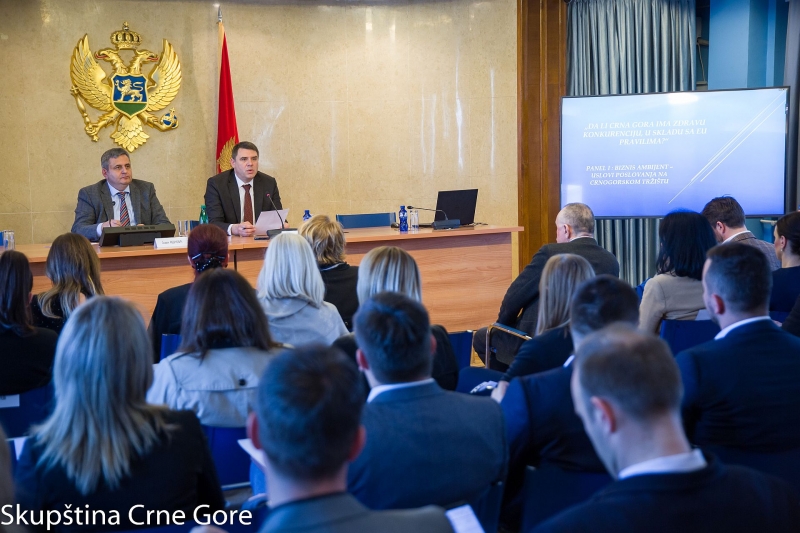The roundtable titled “Does Montenegro have a healthy competition in line with the EU rules?” was organised in the Parliament of Montenegro today, as part of the initiative of the Committee on European Integration regarding the supervision of the obligations related to the issues of special importance for Montenegro’s accession process to the EU.
Chairperson of the Committee on European Integration Mr Slaven Radunović explained that the aim of events like this one was to discuss on important topics related to negotiation chapters 8 - Competition, 6 - Company law and 20 - Enterprise and industrial policy from different perspectives and to learn lessons and draft recommendations for better solutions in these fields.
Mr Aleksandar Drljević, Chief Negotiator for Montenegro's Accession to EU, delivered introductory remarks. He spoke about the improvement of the legislative framework as an important precondition for the efficient functioning of the Montenegrin market (laws on labour, public procurements, private and public partnership, concessions and companies), and especially emphasised the importance of keeping healthy competition and respecting market rules.
During the panel "Business Environment - Business Conditions in the Montenegrin Market", Mr Goran Nikolić, Director General of the Directorate for Industry and Transformation at the Ministry of Economy and negotiator for negotiation chapters 6 - Company law and 20 - Enterprise and industrial policy, Mr Predrag Mitrović, President of the Union of Employers of Montenegro, and Ms Mila Kasalica, an economic analyst, spoke with the participants.
Mr Nikolić stressed the Government’s devotion to continuous promotion and improvement of business environment, including, inter alia, support programmes in the digitalisation field and business operations in international market, simplifying procedures for establishing enterprises and adoption of industrial policy and smart specialisation strategy. According to him, this have resulted in the an increase in the number of small and medium-sized enterprises and an increase in employment, and Montenegro fulfilled all requirements for the temporary closure of two negotiation chapters - 6 and 20. Mr Mitrović spoke about the issue of "Five Business Killers", published by the Union of Employers of Montenegro in 2013, identifying five major business barriers - inadequate regulatory framework, difficult access to funding, the shadow economy, corruption in all areas and at all levels, and a mismatch between the education system and the real needs of the labour market. He shared with the attendees an opinion on the results achieved and the current situation within each of these areas. Ms Kasalica spoke about the overall economic environment in Montenegro and pointed out that it could not be discussed outside the context of competition, which she defined as the rule of law in the economy. She shared with the attendees views on basic economic macro data and factors of long-term sustainable development, and through concrete case studies spoke about the importance of responsible behaviour of competent institutions and improvement of overall business culture, as a precondition for better quality of life in Montenegro.
In the discussion that followed, the participants discussed the balance of payments of Montenegro, the state of the industry, the social responsibility of companies operating in the Montenegrin market and the efficiency of inspection, as well as the position of non-governmental organisations, the quality of the education system, and the interest of young people in entrepreneurship and their access to sources of financing.
The second panel was devoted to the topic "How the State Protects Competition - The Role of the Agency for Protection of Competition”. The panellists Ms Biljana Jakić, Director General of the Directorate for Internal Market and Competition at the Ministry of Economy and negotiator for Chapter 8, Mr Miodrag Vujović, President of the Agency for Protection of Competition and Head of the Working Group for Chapter 8, and Mr Aleksandar Damjanović, independent MP, spoke with participants as panellists.
As negotiator for Chapter 8, Ms Jakić spoke about meeting the European Commission's benchmarks and Montenegro's readiness to open competition negotiations. In this context, she particularly emphasised the adoption of the Law on State Aid Control, the harmonisation of fiscal aid schemes, and the establishment of an independent operational control body in the field of competition policy - the Competition Agency. Mr Vujović spoke about the good alignment of Montenegro's legislative solutions with the EU acquis in this area, but also about the challenges that exist for their effective implementation. In this regard, he spoke about the competencies and performance of the Competition Agency in four key areas of control - prohibited agreements, concentrations, dominant position and state aid (whose control falls under the Agency's responsibility since January 2019). Mr Damjanović thinks that Montenegrin economy must be competitive from the inside in order to be able to withstand competition from the outside, and in this context he spoke in particular about the extent to which the key institutional reforms were carries out and the legal, institutional and financial independence of the Competition Agency. Mr Damjanović particularly referred to legislative amendments related to the reporting to the Parliament on state aid, and emphasised that the oversight and control role of Parliament in this area should be much greater.
The roundtable participants also discussed the business perspective and state aid to Montenegro Airlines, the bankruptcy proceedings at the Aluminum Plant Podgorica, as well as the issues of responsibility for the results achieved in the field of competition protection.
The round table of the Committee on European Integration was also the preparation for a consultative hearing dedicated to the negotiation chapter 8, which will be organised this month by the Committee.












